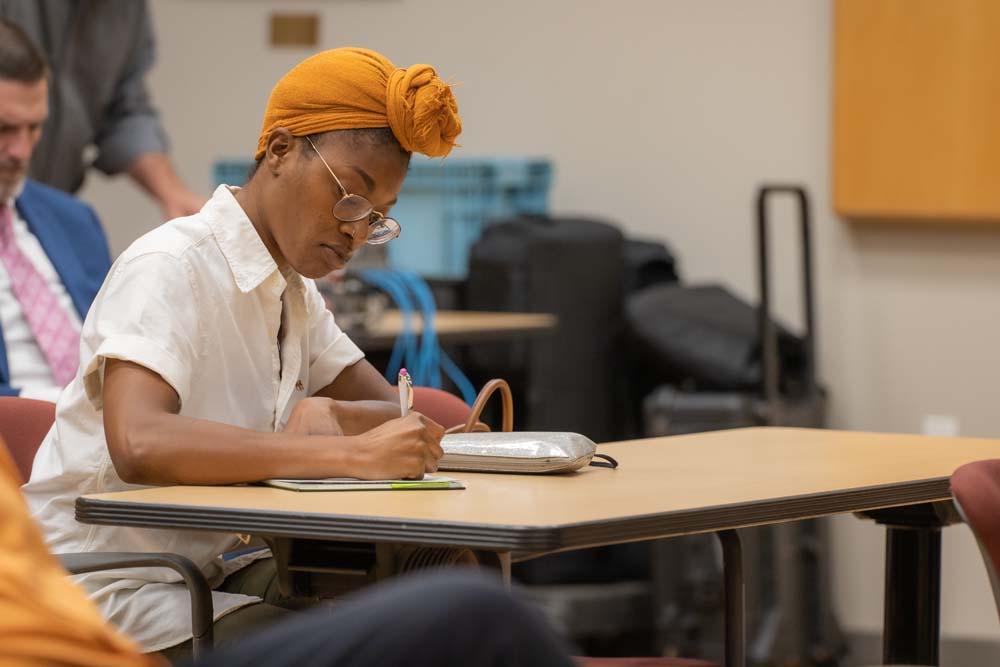Notes from the President
Chris Gray, Ph.D. | Founding President, Erie County Community College of Pennsylvania
As I write this, the holiday season is in full swing. Black Friday and Cyber Monday officially ushered in this time of consumption and conviviality, and it would be easy to surrender to the temptation to celebrate this "most wonderful time of the year" unquestioningly. Yet, it's our duty as citizens of the world and members of the human race to be more circumspect. The United Nations has designated Human Rights Day to be celebrated annually on December 10, a reference to Article 1 of the Universal Declaration of Human Rights (UDHR), first adopted in 1948, which states that "All human beings are born free and equal in dignity and rights." Falling as it does squarely within the holiday season, Human Rights Day invites — no, it demands — us to pause and consider those who suffer and struggle and to see what mitigations are within our power to bring to fruition.
Our county is home to many who suffer and struggle, and Erie County has 26.2% of its residents living in poverty according to the latest US Census data. This means that more than one person in four suffers in poverty conditions, including income, employment, healthcare, and food insecurity. It's easy for Americans to imagine that this kind of suffering occurs somewhere else to someone else, but it's right here in our backyard. And, of course, it impacts our students as well. Poverty cuts across racial and gender lines, but it is often hidden from immediate view and requires that we strive to look beneath the surface of what we see if we are to create systems that foster and promote true equity for all.
This process will take time and work, but it's well worth pursuing as we work to be our community's college. For example, during a recent forum to discuss diversity, which I contend is crucial to achieving any sort of equity, I met with African American organizations to learn what challenges the students of color are facing. This is one step of many, and I will continue hosting these luncheons in the months to come so that I can better understand what needs to happen next in our diverse community. Until we develop an understanding of what our students are facing, we can't create the programs and take the steps necessary to help them. I am personally committed to establishing and maintaining a line of free and open communication with those whom we serve so that we can learn to help and serve them better.
Here at EC3PA, we are just beginning to establish services to address basic needs and combat various insecurities that our students may have, but first and foremost, we aim to forge trust-based relationships with our students. We need to ensure that they feel welcomed, comfortable, and able to talk to us about their needs without fear or judgment. Without this relationship, progress will not be possible.
To accomplish this end, our counselors have put together a resource list of local agencies that we use to help students find assistance in satisfying their basic needs. In addition, we have take-and-give mini-pantries at two of our locations. These are stocked with non-perishable items that are donated by faculty, staff, and students. These include fruit cups, fruit and grain bars, crackers, Pop-Tarts, etc. These also include soups, macaroni and cheese cups, and other water-based mixes that can be cooked in microwaves close to the pantries' physical location. The campaign "Take What You Need and Give What You Can" provides the opportunity for students and community members to help others and easily receive help. Because these are grab-and-go stations, we only solicit and provide non-perishable items, thereby eliminating the need for monitoring. This setup allows anyone who needs something to access it without feeling a sense of obligation or shame, and it also reifies the tenet that everyone in our campus community has something to contribute. Thus, students, faculty, and staff can donate as little or as much as they're able – again, without obligation or shame. The aim is to make a culture of care, where everyone feels supported and supportive.
I can't help but think that the UN decision to commemorate Human Rights Day during the holidays was done to help remind the world of those less fortunate - to take the focus off conspicuous consumption and turn it outward instead and encourage us to help our neighbors. As Charles Dickens famously penned in A Christmas Carol, "At this festive season of the year…it is more than usually desirable that we should make some slight provision for the poor, who suffer greatly at present…. We choose this time, because it is a time, of all others, when Want is keenly felt, and Abundance rejoices." Being a community college means that we have the duty and responsibility to look after each other and help each other. EC3PA is committed to the notion that poverty is an equity issue that we all need to work together to address during the holidays and always. And address it we will — together.




